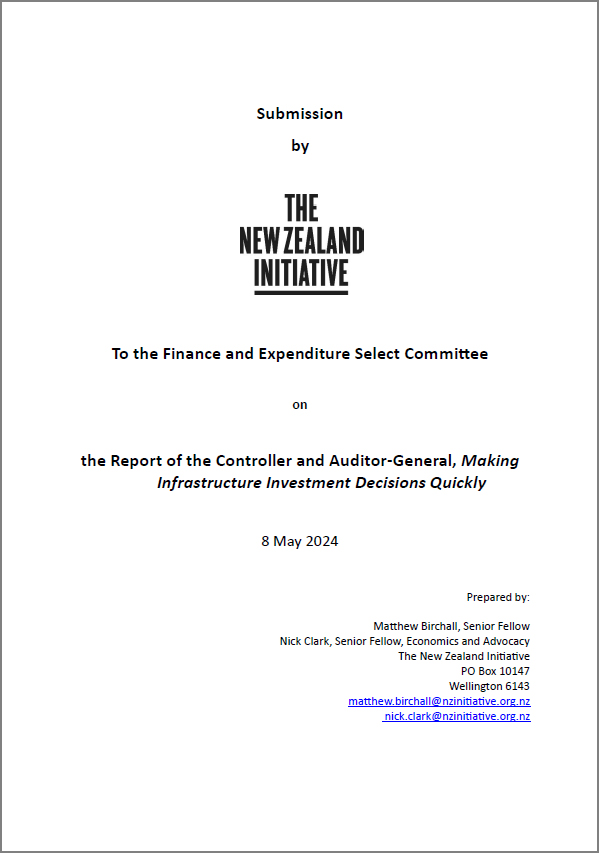1.1 This submission, in response to the Controller and Auditor-General’s report Making Infrastructure Investment Decisions Quickly (2023), is made by The New Zealand Initiative (the Initiative). The Initiative is a Wellington-based think tank supported primarily by major New Zealand businesses. In combination, our members employ more than 150,000 people.
1.2 The Initiative undertakes research that contributes to developing sound public policies in New Zealand and creating a competitive, open and dynamic economy and a free, prosperous, fair and cohesive society.
1.3 The Initiative’s members span the breadth of the New Zealand economy. Robust public investment practices in infrastructure are important to them. The views expressed in this submission are those of the authors, not those of our members.
1.4 In summary, we submit:
(a) Treasury should adopt the three recommendations the Auditor-General has made in his report.
These are:
i) establish regular public reporting on the progress of the full New Zealand Upgrade Programme and periodically report on the performance of all significant investments that have had or that require Cabinet-level consideration;
ii) seek feedback from relevant agencies on how useful they find the Treasury’s guidance on expediting decision-making and review that guidance regularly to ensure that it remains fit for purpose;
iii) consider whether the Investment Management System should include minimum requirements and guidance for setting up and running contestable funding processes.
(b) Implementing these changes would help improve decision-making for major projects – a timely intervention given the scale of New Zealand’s infrastructure challenges.
Public funds should be invested transparently with a clear focus on value for money. The Auditor-General’s recommendations offer practical measures to help address the shortcomings of the $12 billion New Zealand Upgrade Programme (NZUP) and the $3 billion Shovel Ready Programme (SRP).
(c) However, while the recommendations in the Auditor-General's report are positive, they are directed at officials rather than Ministers. We are concerned that major infrastructure and development project investment decisions appear to have been politicised. In particular, we regret that the then-Ministers committed significant government funding to projects without adequate information and sometimes bypassed processes set up to provide that information.
(d) This speaks to a broader problem whereby Ministers lack the right incentives to make commercially sound, fiscally responsible investment decisions. Time constraints only exacerbate this problem, as illustrated by the shortcomings of the NZUP and SRP. Such an approach to public investment should be of concern to this Committee.
(e) We would like to see the Finance and Expenditure Committee address the underlying problems that contributed to the poor investment decisions detailed in the report. In particular, we submit that the Committee should recommend to the Minister of Finance the establishment of an independent Office of Parliament to scrutinise government spending and fiscal prudence. This would place firmer constraints on the Executive Government regarding value for money.







